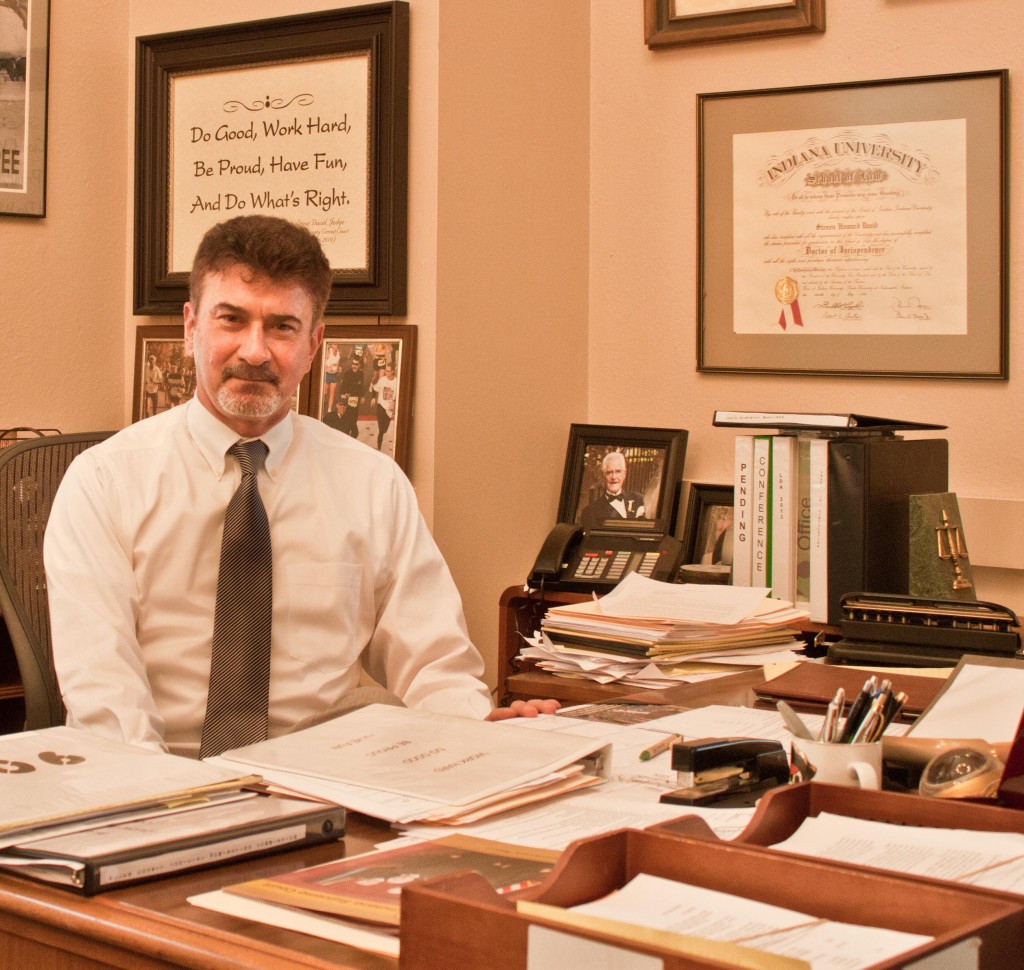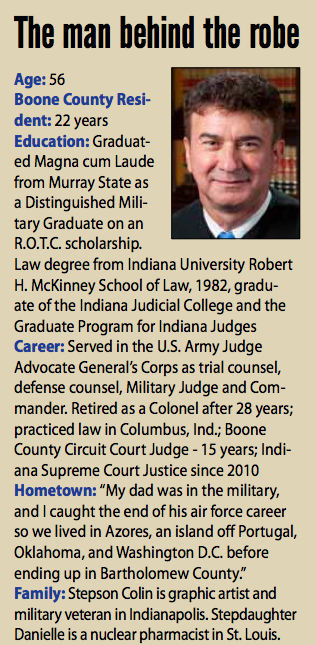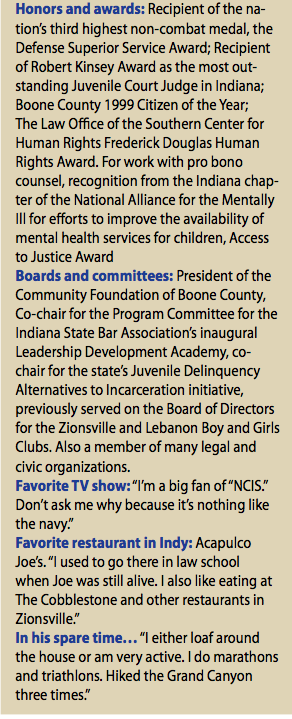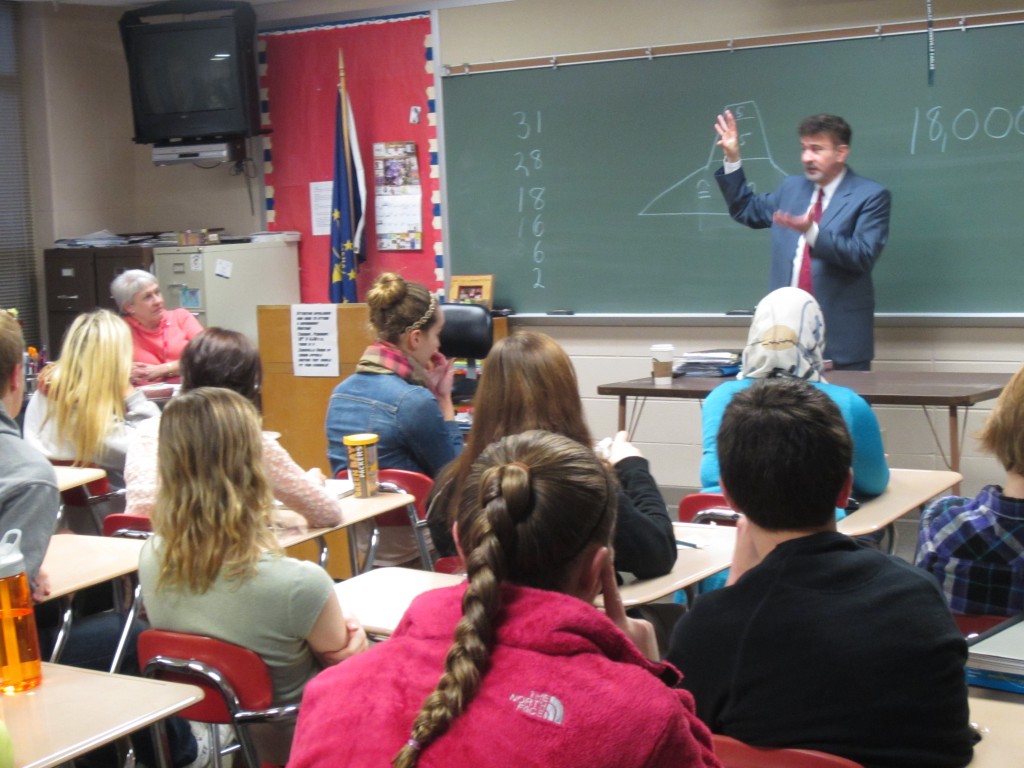Indiana Supreme Court Justice lives by the rule of the law

“The Rule of Law Always” is the motto Indiana Supreme Court Justice Steven H. David lives by.
He has the saying hanging up in his office and is reminded of the phrase daily, as he wears the words on wristband. The saying is with him wherever he goes, no matter if he’s at home in Whitestown watching ESPN or contemplating a case in his chambers.
And the saying was with him when he served as Chief Defense Council for the 2007 trial of Osama Bid Laden’s bodyguard and alleged terrorist Salim Ahmed Hamdan, in Guantanamo Bay, Cuba.
 Since graduating from Indiana University’s McKinney School of Law in 1982, Justice David has practiced many different forms of law, both military and civilian, and has presided over more than 15,000 civil, criminal and juvenile cases as a justice, a military judge and as a Boone County judge for 15 years. But he said serving as Chief Defense Council in Guantanamo Bay was one of the most difficult times in his life, both professionally and personally.
Since graduating from Indiana University’s McKinney School of Law in 1982, Justice David has practiced many different forms of law, both military and civilian, and has presided over more than 15,000 civil, criminal and juvenile cases as a justice, a military judge and as a Boone County judge for 15 years. But he said serving as Chief Defense Council in Guantanamo Bay was one of the most difficult times in his life, both professionally and personally.
“You’re defending someone who was accused of being part of 9/11, so then it becomes ‘do your duty and honor your oath as an attorney’ to make sure everyone is entitled to a fair trial and hold the government accountable,” he explained. “It’s the rule of law always. It’s not the rule of law when it’s easy or the rule of law when everything is calm. It’s the rule of law always.”
In the years following 9/11, the Bush administration was trying to assert the Guantanamo Bay detention camp could be considered outside of U.S. legal jurisdiction and that detainees had no constitutional rights or any of the protections of the Geneva Convention, including humanitarian treatment of war.
The U.S. Supreme Court ruled against the Bush administration in the historic Hamdan vs. Rumsfeld in 2006, ruling that the military commissions set up by the Bush administration to try the detainees violated both the Uniform Code of Military Justice and the four Geneva Conventions. Justice David was in Guantanamo Bay for that historic decision, and read it to the military personnel present as it came across the fax machine.
Hamdan was one of the first detainees to be tried with this new system, and David was the Chief Defense Council overseeing the entire operation.
“It was a very new process with a lot of other issues. It was legally very challenging and there were wonderful people on both sides. There was a lot of pressure on prosecutors, lots of pressure on the government, lots of pressure on the defense; all from different sources, and there was more attention on that venue.”
“It wasn’t the military justice system, it wasn’t the federal justice system. It was specially created for that prosecution, with a little bit of how they handled the post-assassination of Abe Lincoln, a little bit of how they handled the post-WWII prosecution, and it was modernized, so the system of rules was different,” he said.
The trial ended with Hamdan being acquitted of terrorism conspiracy charges and sentenced to five and a half years of imprisonment. While a challenging time, David said the experience made him the person  he is today.
he is today.
“In hindsight it was a great experience for me personally, but at the time it was very difficult. My favorite quote is, ‘Life is not the way it’s suppose to be, it is the way it is. It is the way you cope with it that makes a difference,’” he said.
David retired from the military in 2010 after 28 years of service, coinciding with his nomination and selection as the Indiana Supreme Court’s 106 justice. For the last two years, he has served as one of five Indiana Supreme Court justices; a group he says he is lucky to be a part of.
“In some states you don’t talk to another justice unless you’re all present, it’s very regimented and formal, but we’re much more open and relaxed. As a group, we’re very diverse people with diverse backgrounds, and we try to reach consensus and respect everyone’s opinions,” he said.
“We work together really well,” said Indiana Supreme Court Justice Loretta Rush, who has known David for 15 years and was appointed to the Indiana Supreme Court in December 2012.
“Justice David has such a high standard of the law, believes so fundamentally in the issues of justice and wants the court to be the best it can be,” Rush said. “He is really good at working with people and with working on building consensus.”
Each year the Indiana Supreme Court hears around 1,000 cases. Theyare required to take cases involving life without parole, the death penalty, cases involving disciplinary matters between attorneys and judges, and in which a trial judge rules an Indiana law unconstitutional. Otherwise, it’s up to the group to decide what cases are heard. Three out of five votes are needed to take a case, and David said the justices meet weekly to discuss cases they’re reviewing.
He said each justice has their own reasons, but they may take a case because it’s a new area of law or something they want to write an opinion on. For every case they hear, they do independent analysis and come together to make one majority decision.
“People asked me the first couple of months I was on the Supreme Court how I liked my new friends, and I said they’re not friends, they’re family. It doesn’t mean you always agree with your brother or sister, but when all is said and done, it’s done and you move on to the next matter,” he said.
“It’s resulted in a very good national reputation, and hopefully that’s something that permeates our legal profession.”



